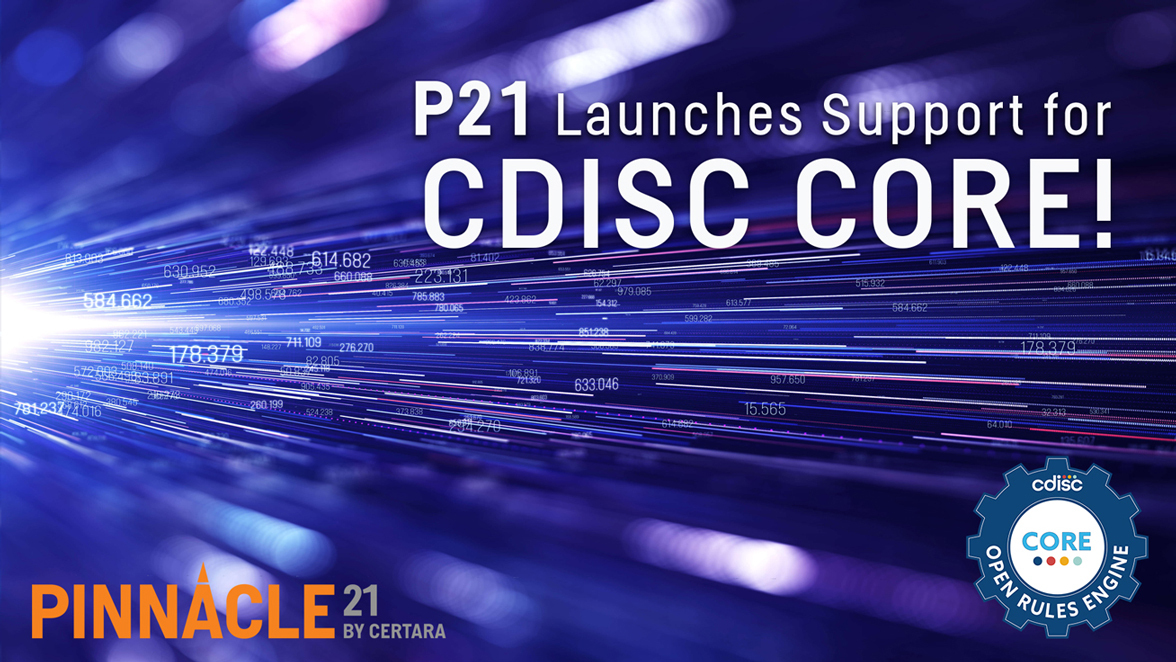CDISC

P21 is proud to announce that support for CDISC Open Rules Engine (CORE) is now available in P21 Community 4.0. We have expanded CORE’s reference implementation to let you execute machine-readable CDISC Conformance Rules within the familiar P21 toolkit. This new CDISC Engine can run from the desktop GUI or command-line interface (CLI) on any platform in which you have already installed P21 Community.
On November 29th, CDISC released updated versions of SDTM and ADaM, including standardized structures for medical devices and new non-compartmental analysis data.
Moving to new versions of standards is always a challenge and requires planning. Pinnacle 21's subject matter experts Trevor Mankus and Michael Beers summarized key changes and answered industry questions in this webinar and the discussion below, so you can better prepare to up-version your study data.
P21 Validation Engine Improvements
The P21 Validation Engines are consistently updated and improved upon with insights from our Subject Matter Experts, consultations with regulatory agencies, and findings submitted by our users. Examples include:
-
AD1012 has been split into two rules: AD1012 and AD1012A. The former checks for custom variables and is a Warning; the later checks for standard variables and is an Error. These rules consider secondary variable names ending in *N or *C, for numeric or character equivalent, respectively.
-
AD0047 was producing problems for some variables but has already been fixed and patched for over a year.
(Originally published on October 6, 2020. Last Updated on October 30, 2020)
Effective October 1st, 2020, China’s NMPA will accept CDISC submissions. To support this initiative, Pinnacle 21 has released a new Chinese-language validation engine, available now in both Enterprise and Community. This engine supports datasets with Chinese-encoded characters and displays rule messages and descriptions in Chinese translation.
Regulatory Expectations
These Data Standards Catalogs from the FDA and PMDA show the valid ADaM-IG versions for your submission’s date.
- FDA currently accepts ADaM-IG 1.0 and ADaM-IG 1.1.
- Note: ADaM-IG 1.0 is only accepted for studies that began prior to the dates below. If your study started on or after these dates, then you can no longer use ADaM-IG 1.0 to submit that study.
- 03/15/2019 for NDAs, ANDAs, and certain BLAs
- 03/15/2020 for certain INDs
- Note: ADaM-IG 1.0 is only accepted for studies that began prior to the dates below. If your study started on or after these dates, then you can no longer use ADaM-IG 1.0 to submit that study.
- PMDA currently accepts ADaM-IG 1.0 only. Note: Unlike the FDA, the PMDA does not grant exceptions for issues in the Reject category.
Intro to ADaM Conformance
ADaM data are required by the FDA and PMDA, and accepted by China’s NMPA. Agencies often begin reviews with ADaM data validation, which helps them understand the analyses performed and reproduce results.
This is the first in a series of posts where we answer questions from our recent webinar, Exploring Common CDISC ADaM Conformance Findings. In this post, we focus on implementation recommendations.
In the regulatory review process, it's critical to have analysis data that comply with the CDISC ADaM standard. Both the FDA and PMDA require ADaM data, and as they begin reviews, they start with ADaM data validation. ADaM data help these agencies understand the analyses performed and reproduce the results for further validation.
In this webinar, Trevor Mankus covers the more commonly occurring validation rules and some potential reasons why they fired.





